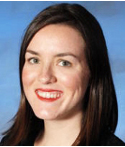Collison receives Fulbright to study in Nicaragua

Collison receives Fulbright to study in Nicaragua
- May 8, 2014
- Funding will support research on electoral involvement of young adults
-----
 In a country where 16-year-olds are allowed to vote and the median age of the entire
population is just 23.4 years, Nicaragua’s future is heavily shaped by young adults,
says Eliza Collison, UCI international studies major. She’s interested in learning
just how involved they are in elections, a topic she will be studying in depth in
the Central American country, thanks to funding from a newly awarded Fulbright grant.
In a country where 16-year-olds are allowed to vote and the median age of the entire
population is just 23.4 years, Nicaragua’s future is heavily shaped by young adults,
says Eliza Collison, UCI international studies major. She’s interested in learning
just how involved they are in elections, a topic she will be studying in depth in
the Central American country, thanks to funding from a newly awarded Fulbright grant.
Beginning in fall, she will spend 10 months working in collaboration with the Ethics and Transparency Foundation, the Institute of History of Nicaragua and Central America at Central American University, and the Martin Luther King Institute at the Polytechnic University of Nicaragua to study the depth of young adult electoral involvement, factors which may impede it, and how these obstacles may be overcome.
Prior to travelling to Nicaragua, Collison will spend the summer interning with Innovations
in Civic Participation in Washington, D.C. The non-governmental organization supports
the development of youth civic policies across the globe, a topic that ties nicely
with her Fulbright-funded research. After completing her research in spring 2015,
she plans to pursue a graduate program in international affairs through the Peace
Corps Masters Program and eventually, a career in the foreign service.
As a student at UCI, Collison has been an active member of Global Connect and the
UCI Student Alumni Association, serving for the latter as the Vice President of Programs
and Events. She studied abroad in Chile for the 2012-13 academic year and used her
experience to pursue research through UCI’s Undergraduate Research Opportunities Program
on the role of the Catholic church in integrating Peruvian immigrants in Chile. She
has been part of the Campuswide Honors Program since her freshman year at UCI and
she will be graduating in June with international studies, Latin, and campuswide honors.
The Fulbright U.S. Student Program, sponsored by the U.S. State Department, is the
largest international exchange program in the U.S. The program annually funds 1,900
scholars pursuing research in 140 countries worldwide.
-----
Would you like to get more involved with the social sciences? Email us at communications@socsci.uci.edu to connect.
Share on:
Related News Items
- Careet RightNew UC Irvine Center for Socially Engaged Philosophy aims to address real world problems
- Careet RightOlson receives Charles Taylor Book Award for work on subordination and resistance
- Careet RightUnder Trump, sanctuary cities and states come under fire over immigration policies
- Careet RightBrain teasers in language research
- Careet RightRaising the minimum wage actually increases racial disparities


